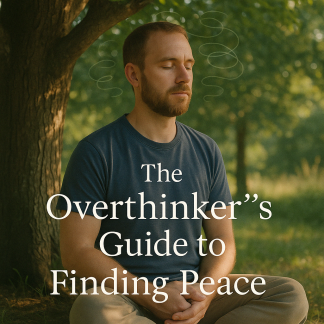The Overthinker’s Guide to Finding Peace
“Did I say the wrong thing?” “What if I made a mistake?” “Should I have done that differently?”
If your mind often runs in circles like this, you’re not alone.
Overthinking is one of the most common issues I see in therapy. It’s that mental loop of going over something again and again, turning it around, looking at it from every angle, trying to predict outcomes, replaying the past, or solving a problem that hasn’t even happened yet.
It can feel like thinking is the only way to stay in control or get it right. But often, the result is the opposite—more confusion, more anxiety, more exhaustion.
So why do we overthink? And how do we begin to find peace?
Why We Overthink
At its core, overthinking is a strategy. Not a good one—but a strategy, nonetheless. It often shows up in response to anxiety, fear of uncertainty, perfectionism, or past experiences where things felt out of control.
Your mind might believe that if it just thinks enough, it will find the perfect answer, avoid a mistake, or keep you safe from harm or embarrassment. It’s protective—but over time, it becomes a prison.
Here’s the thing: we can’t outthink life. We can’t prevent every possible scenario or rewrite what’s already happened. What we can do is notice when we’re overthinking and gently shift into a different way of relating to our thoughts.
Recognising the Pattern
The first step is awareness. Overthinking often masquerades as productivity or preparation, but if you notice any of the following, you’re probably caught in the loop:
- Replaying the same scenario repeatedly in your mind
- Struggling to make even small decisions
- Worrying about things you can’t control
- Feeling mentally drained but not emotionally resolved
- Thinking about what you should have said or done, hours or days later
When you recognise the pattern, name it. “This is overthinking.” That small act of naming creates a space between you and the thought. From that space, you can choose a new response.
Shifting from Looping to Living
Here are a few gentle strategies I often explore with clients who want to quiet the noise in their heads:
- Notice the fear underneath.
Overthinking is rarely about the surface issue. Ask yourself: What am I afraid will happen if I let this go? Often, the answer reveals something tender—a fear of judgment, rejection, failure, or simply not feeling “enough.” - Practice “good enough” thinking.
Striving for the perfect answer or decision keeps us stuck. Ask instead: What’s a kind, reasonable next step? You can always course correct. - Set time limits for decisions.
Try giving yourself 10 minutes to think through an issue. Then pause. Walk away. Let your intuition speak. - Ground in your body.
Overthinking is a head-heavy experience. Come back to your body through breath, movement, or grounding techniques (even just placing your feet on the floor and noticing the sensation). - Be kind to the part of you that’s worrying.
Instead of berating yourself for overthinking, try: “Thank you for trying to keep me safe. I’ve got this now.” That internal reassurance can do more than hours of mental debate.
You Don’t Have to Think Your Way to Peace
One of the biggest myths we carry is that if we think hard enough, we’ll feel better. But peace doesn’t come from perfect answers—it comes from learning to live with imperfection, uncertainty, and emotion in a gentler way.
In therapy, we can explore the deeper roots of your overthinking. Maybe it’s linked to past experiences, unmet expectations, or old beliefs that no longer serve you. Maybe you’ve never had a space where your fears could be met with empathy, not judgment.
Whatever the story behind your overthinking, there is a way forward that doesn’t require carrying the weight of every thought alone.
An Invitation
If this post resonates, consider this a gentle invitation to slow down and begin listening inward rather than thinking your way out. You don’t need to have everything figured out to begin. You just need a safe place to start.
I offer a free 30-minute consultation to explore whether therapy might be a good fit for you. You can learn more about how I work and hear from others who’ve taken that first step at jon-rowe.com.
Sometimes, the most powerful choice isn’t one more thought. It’s simply showing up, as you are.
Jon x

